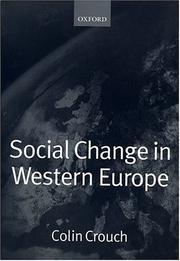| Listing 1 - 10 of 29 | << page >> |
Sort by
|
Multi
ISSN: 09442294 ISBN: 3906754510 9783906754512 Year: 1997 Volume: 9 9 Publisher: Berne: Peter Lang,
Abstract | Keywords | Export | Availability | Bookmark
 Loading...
Loading...Choose an application
- Reference Manager
- EndNote
- RefWorks (Direct export to RefWorks)
International law --- Europe --- Social change --- Social conditions --- 20th century --- Social change - Europe --- Europe - Social conditions - 20th century
Book
ISBN: 9782296066847 2296066844 Year: 2008 Publisher: Paris: L'Harmattan,
Abstract | Keywords | Export | Availability | Bookmark
 Loading...
Loading...Choose an application
- Reference Manager
- EndNote
- RefWorks (Direct export to RefWorks)
Political science --- Social change --- Science politique --- Changement social --- European Union --- Europe, Eastern --- Europe, Central --- Social conditions --- Social change - Europe, Eastern --- Social change - Europe, Central --- Europe, Eastern - Social conditions - 1989 --- -Europe, Central - Social conditions - 1989 --- -Political science --- -Social change - Europe, Eastern --- -Social change
Book
ISBN: 0429619626 0429055145 9780429055140 9780367151188 0367151189 9780429619625 9780429617478 042961747X 9780429621772 0429621779 Year: 2021 Publisher: New York: Routledge,
Abstract | Keywords | Export | Availability | Bookmark
 Loading...
Loading...Choose an application
- Reference Manager
- EndNote
- RefWorks (Direct export to RefWorks)
In the last two decades, the quest for a widely accepted definition of social enterprise has been a central issue in a great number of publications. The main objective of the ICSEM Project on which this book is based was to show that the social enterprise field would benefit much more from linking conceptualisation efforts to the huge diversity of social enterprises than from an additional and ambitious attempt at providing an encompassing definition. Starting from a hypothesis that could be termed "the impossibility of a unified definition", the ICSEM research strategy relied on bottom-up approaches to capture the social enterprise phenomenon in its local and national contexts. This strategy made it possible to take into account and give legitimacy to locally embedded approaches, while simultaneously allowing for the identification of major social enterprise models to delineate the field on common grounds at the international level. Social Enterprise in Western Europe -the third volume in a series of four ICSEM-based books on social enterprise worldwide - will serve as a key reference and resource for teachers, researchers, students, experts, policy makers, journalists and others who want to acquire a broad understanding of the social enterprise and social entrepreneurship phenomena as they emerge and develop in this region.
Social entrepreneurship --- History. --- Entrepreneurship --- Social change --- History --- Europe --- Social policy --- Social entrepreneurship - Europe - History --- Social change - Europe - History --- Europe - Social policy --- Social policy.

ISBN: 0857456857 9780857456854 1845453336 Year: 2006 Publisher: New York, NY : Berghahn Books,
Abstract | Keywords | Export | Availability | Bookmark
 Loading...
Loading...Choose an application
- Reference Manager
- EndNote
- RefWorks (Direct export to RefWorks)
In the 1960s and 1970s, Western Europe's "Golden Age" (Eric Hobsbawm), a new youth consciousness emerged, which gave this period its distinctive character. Offering rich and new material, this volume moves beyond the easy conflation of youth culture and "Americanization" and instead sets out to show, for the first time, how international developments fused with national traditions to produce specific youth cultures that became the leading trendsetters of emergent post-industrial Western societies. It presents a multi-faceted portrait of European youth cultures, colored by differences in gender, class, and education, and points out the tension between emerging consumerism and growing politicisation, succinctly expressed by Jean-Luc Godard in his 1967 pairing of "Marx and Coca-Cola."--
Popular culture -- Europe. --- Social change -- Europe. --- Subculture -- Europe. --- Young consumers -- Europe. --- Youth -- Europe. --- Youth -- Political activity -- Europe. --- Popular culture --- Social change --- Subculture --- Young consumers --- Youth --- Political activity
Book
ISBN: 9783451332784 3451332787 Year: 2013 Publisher: Freiburg: Herder,
Abstract | Keywords | Export | Availability | Bookmark
 Loading...
Loading...Choose an application
- Reference Manager
- EndNote
- RefWorks (Direct export to RefWorks)

ISBN: 0198780680 0198742754 9780198780687 Year: 1999 Publisher: Oxford: Oxford university press,
Abstract | Keywords | Export | Availability | Bookmark
 Loading...
Loading...Choose an application
- Reference Manager
- EndNote
- RefWorks (Direct export to RefWorks)
What do European societies look like, at the end of a turbulent millennium which saw western Europe slowly rise to global domination, and then rapidly decline to its present position, prosperous but clearly behind the USA in world influence? This is the only book by a single sociologist to make a systematic and up to date comparison of virtually all west European countries across a wide range of social institutions. These include : work and occupations, the structure of the economy, the family, education, religion, nationality and ethnicity, and the mechanism of citizenship in the welfare state. Particular emphasis is placed on the place of gender and social class. By including basic details on Japan and the United States throughout, the author is able to draw attention to any shared west European specificities. The book also develops a theory of change in contemporary societies. Starting from a model of a mid-century social compromise based on certain balances between industrialism, capitalism, traditional community institutions, and community it traces its subsequent destabilization and places particular importance on the resurgence of capitalism in shaping a new social order. This important new study of the social structure of western Europe will be essential reading for all students of comparative sociology and European sociology
Social change --- Europe --- sociale veranderingen --- 316.42 --- 316.42 Social change. Sociale ontwikkeling. Sociale veranderingen. Modernisering. Evolutie .Sociale revolutie. Modernisme --- Social change. Sociale ontwikkeling. Sociale veranderingen. Modernisering. Evolutie .Sociale revolutie. Modernisme --- West-Europa --- Europe, Western --- Social conditions --- Changement social --- Europe de l'Ouest --- Conditions sociales --- Europe [Western ] --- 20th century --- Social change - Europe, Western. --- Europe, Western - Social conditions - 20th century. --- Social change - Europe, Western --- Europe, Western - Social conditions - 20th century --- West-Europa.

ISBN: 3406534449 9783406534447 Year: 2005 Volume: 5 Publisher: München: Beck,
Abstract | Keywords | Export | Availability | Bookmark
 Loading...
Loading...Choose an application
- Reference Manager
- EndNote
- RefWorks (Direct export to RefWorks)
Europäische Integration --- Social change --- European federation --- Identity (Psychology) --- Politische Identität --- European federation. --- Personal identity --- Personality --- Self --- Ego (Psychology) --- Individuality --- Federation of Europe --- Pan Europa movement --- Paneuropean federation --- United States of Europe (Proposed) --- Federal government --- Regionalism (International organization) --- Change, Social --- Cultural change --- Cultural transformation --- Societal change --- Socio-cultural change --- Social history --- Social evolution --- Social change - Europe --- Identity (Psychology) - Europe

ISBN: 1861344716 1861344724 9786612318450 1282318454 1847425895 144730232X 9781861344724 9781861344717 9781847425898 Year: 2004 Publisher: Bristol: Policy,
Abstract | Keywords | Export | Availability | Bookmark
 Loading...
Loading...Choose an application
- Reference Manager
- EndNote
- RefWorks (Direct export to RefWorks)
Family policy --- Families --- Social change --- -#SBIB:042.AANKOOP --- #SBIB:316.356.2H5500 --- Families and state --- State and families --- Public welfare --- Social security --- Social policy --- Gezinsbeleid: algemeen --- Government policy --- #SBIB:042.AANKOOP --- Change, Social --- Cultural change --- Cultural transformation --- Societal change --- Socio-cultural change --- Social history --- Social evolution --- Family policy - Europe --- Families - Europe --- Social change - Europe
Book
ISBN: 1461468140 1461468159 Year: 2013 Publisher: New York : Springer,
Abstract | Keywords | Export | Availability | Bookmark
 Loading...
Loading...Choose an application
- Reference Manager
- EndNote
- RefWorks (Direct export to RefWorks)
This volume offers a new perspective on social dynamics and culture change in the North Central European Plains (NCEP) from 600 to 900 CE. Using archaeological evidence, this volume follows and analyzes the rise of social complexity in this region. It discusses long-term causal processes leading to the formation of state at the fringes of the Merovingian and Frankish Kingdoms, the Carolingian and the Holy Roman Empire, the Scandinavian Kingdoms, the Czech Kingdom, and the Kingdom of Rus. The central problem addressed is accounting for and explaining the transition from noncomplex to supra-tribal polities between 600 and 900 CE. The examined evidence shows that a very basic community-level management of common pool resources seems a successful strategy to manage short term risk and may lead to sustainable higher level political organization. In conclusion it present a models of social dynamics of the NCEP, 600-900 CE that suggests that the state formation process was an outcome of spontaneous processes and deterministic factors occurring within a period of approximately 400 years, of which the last two hundred years (800-900 CE) were the most critical. In a broader context, the point discussed is that societal decisions with short-term goals have long-term consequences.
Historical sociology. --- Human ecology -- Europe, Central. --- Social change -- Europe, Central. --- Plains --- Sociology & Social History --- Social Sciences --- Social Change --- Archaeology --- Northern Europe --- History. --- Archeology --- Social sciences. --- Anthropology. --- Social Sciences. --- History, general. --- Anthropology --- Auxiliary sciences of history --- History --- Antiquities --- Human beings --- Annals --- 392 - 814 --- Europe, Central --- Europe, Northern --- Europe, Central. --- Europe, Northern. --- Civilization. --- Antiquities. --- Primitive societies --- Central Europe --- Social sciences

ISBN: 0191599042 0191521035 1282052233 9786612052231 9780191599040 9780191521034 0198294751 9780198294757 9780198279570 0198279574 9781282052239 6612052236 Year: 1995 Publisher: Oxford ; New York : Oxford University Press,
Abstract | Keywords | Export | Availability | Bookmark
 Loading...
Loading...Choose an application
- Reference Manager
- EndNote
- RefWorks (Direct export to RefWorks)
A decline in religious belief and class values, green values feminism, and postmodernism - all these phenomena are indicative of changes in values among West European citizens. The extent & impact of these changes on politics are covered here.
Social values --- Social change --- Change, Social --- Cultural change --- Cultural transformation --- Societal change --- Socio-cultural change --- Social history --- Social evolution --- -Social change --- -#SBIB:324H50 --- 316.752 --- #SBIB:316.7C122 --- 316.752 Waarden --(sociologie) --- Waarden --(sociologie) --- Values --- Europe --- Politieke participatie en legitimiteit (referenda, directe democratie, publieke opinie...) --- Cultuursociologie: overtuigingen, waarden en houdingen --- Social values - Europe. --- Social change - Europe. --- -Europe
| Listing 1 - 10 of 29 | << page >> |
Sort by
|

 Search
Search Feedback
Feedback About UniCat
About UniCat  Help
Help News
News